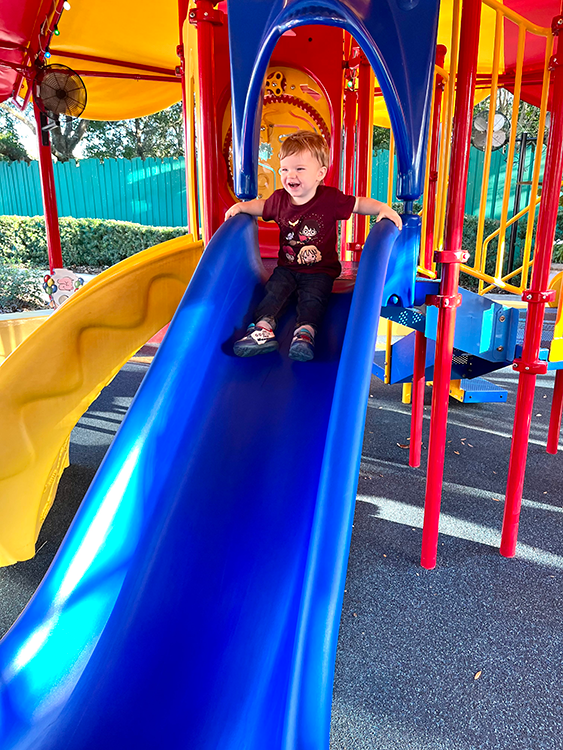When our fifth and youngest child was born, I was concerned about how the new baby might affect our school schedule. Although I had previously experienced homeschooling plus baby-managing with my older son, it had been six years—and six grades—since
then. The kids were now older and more capable of helping with the baby, but there was also heavier and more complex schoolwork to be completed. How would a baby affect the productivity of our school days?
I quickly realized that homeschooling with a baby is easy. A baby sits in your lap, nurses, naps, and that’s about it. Even when he becomes mobile, he isn't very fast or difficult at first. Babies aren't a problem. . . . It’s toddlers that are trouble.

Our last school year, the first of the youngest's toddlerhood, wasn't too bad. Little Man learned to walk about halfway through the year, but we would often sit him in his high chair with a snack and a Baby Einstein video, and he would be content for
a while. There was also at least one nap time we could count on for getting more concentrated work done.
This school year has been a different story. The current situation: homeschooling grades 3, 6, 8, and 9. Little Man turned two last fall and is becoming increasingly less content with his high chair and his videos. Unlike my older son, who was the type
to play quietly but destructively, Little Man is extremely talkative and social. When the older kids and I try to do our morning Bible study, he chatters constantly and crashes matchbox cars into his siblings. When I try to read a book or lesson aloud,
he sings at the top of his lungs or repeats every few words I read. When I'm correcting and explaining schoolwork, he wants “Mama hold you” and undivided attention. Worst of all, he is now refusing naps 95% of the time. Please join me
in a moment of silence. . . . Oh wait—moments of silence don’t exist anymore.
My ideal school day is one that starts at a decent time, operates smoothly with minimal interruption, and ends by mid-afternoon. But how exactly does one accomplish this with a toddler?
When my older son was about three, I attended a conference workshop that was meant to answer this very question. If my memory is correct, the speaker's primary advice was that toddlers can be taught to sit quietly and do solo activities; all it takes
is patience and practice. I don't know about you, but I did not find this particularly encouraging. My girls may have sometimes played peacefully and quietly as toddlers, but this sounded nearly impossible for my son. If this approach works for you,
fantastic! But to me, this sounded like a lot of work with little promise of the desired result.
I find this approach even less tenable with my younger son. The only solution I've found is simply to take turns supervising our little bundle of chaos. While I work with one of my older kids, another of them watches Little Man, and then they swap. Most
of our group activities leave at least one kid free to watch the toddler. The only exception is Bible study, which involves everyone, so we keep him in the room with us. We might try putting him in his room sometime (some moms do enforced rest times!),
but currently our study is often accomplished with a bit of shouting over his chatter. Ahem.
When the instructional part of the school day is done, it's my shift with Little Man while the other kids do their homework. Again, in my ideal scenario, I would put him down for a nap and get a little break or something other than school accomplished.
But most of the time, I spend the remainder of my afternoon with a two-year-old who demands most (if not all) of my attention, and there is little else I can get done before dinner.
In short, this year we're achieving part of my ideal school day—we generally start in good time—but the rest of the plan goes out the window. The days run long, and with frequent interruptions, not much beyond school is normally accomplished. The question around which our whole schedule revolves is, “But who will be watching Little Man?” In other words, it's the toddler who runs our school day.

Yet though it is busy and often seems less productive than I would like, I am reminded that this is essentially all that I did when my girls were little. My days were almost entirely spent supervising, reading stories, playing pretend, taking
walks, and pushing them in the swing. These activities may be far from exciting, but they are still important—not only because of the relationship-building with your child, but because toddlers learn and develop through these activities.
In essence, it is a continuation of my school day because I'm teaching him. It may feel rather tedious and repetitive in comparison to teaching a high schooler, but I have to remember that it won't last long. I'm not a particularly
sentimental person, but even I get a tiny bit heartbroken when I think that his next “Mama hold you” could be his last.
All the same, this kind of school day can be exhausting. In truth, my first draft of this post was from a far more weary point of view. While I was writing it, Little Man climbed out of his crib for the first time, opened his door (also a new trick), and came waltzing out of his room. Our days of toddler chaos have only just begun.

To make a long story short, I don't have any wonderful solutions, only empathy. If you can't figure out how to structure your school day around a toddler, that's okay—neither can I! I'm very much looking forward to summer. But until then,
I'll try to keep in mind that the years are short and that being “productive” looks different in different seasons of life. I will also remember that four is a beautiful age, and surely things will be easier then . . . right around the
same time my oldest gets her driver's license.
Little Man, I just changed my mind—you can stay two forever.
—Jessica
Photo credit: Courtesy of author.

